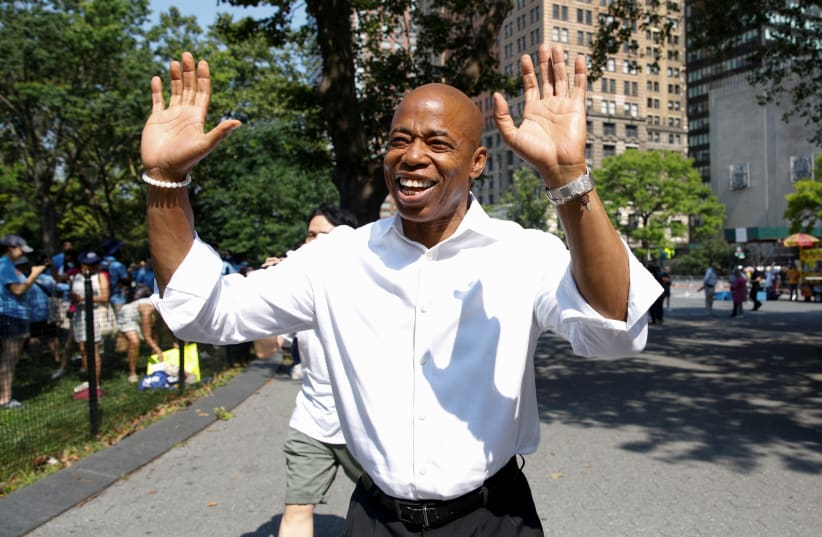NEW YORK – The day after Eric Adams was declared victor of the Democratic primary in New York City’s mayoral race, he paid a shiva call in Flatbush.
“He said he came to shiva because he owes his win all to us,” said Flatbush Jewish Community Coalition chairman Josh Mehlman, who last week was observing the seven-day mourning period following the death of his 92-year-old mother, in an interview with The Jerusalem Post.
The varied local Orthodox Jewish community overwhelmingly supported Adams in the primary, trusting that the moderate Democrat can curb the increasing rates of crime in a city still reeling from the economic toll of the coronavirus pandemic. He will take over as mayor if, as presumed, he defeats long-shot GOP nominee Curtis Silwa on November 2 in a city where registered Democrats surpass Republicans by more than six to one.
Adams, who won by fewer than 8,500 votes, edging out runner-up sanitation commissioner Kathryn Garcia by a little more than one percentage point, has molded ties with New York’s Jewish community during his years as a state senator and subsequently in his current position as Brooklyn borough president. But at the start of the mayoral campaign, his opponent, the other “moderate” candidate – Andrew Yang – received support from many of Brooklyn’s Orthodox Jewish leaders.
By May, there was a sharp turnaround when the Crown Heights electorate announced its support of Adams, 60. In early June, he hooked the official endorsement of the FJCC, a coalition of more than 200 synagogues and Jewish organizations within the greater Flatbush area, considered one of the most coveted backings in the community.
The two more progressive candidates, Garcia and Maya Wiley, won large areas of Manhattan and more well-to-do parts of Brooklyn and Queens.
Mehlman said Adams was the candidate with the most experience and qualifications for the job.
“We put together a solid coalition to help Eric out,” Mehlman recalled. “We registered a lot of people to vote and followed up with a strong Election Day get-out-the-vote campaign. We met with all of the candidates, and Eric was the one most there for us, so we want to be there for him. He has the experience from being a police officer and an executive. He understands Brooklyn and the city and has the ability to bridge groups together,” Mehlman continued.
“We need a mayor who will set the tone of inclusiveness, and Eric Adams is the right person at the right time. He’s good for the city and good for the Jewish community.”
“The entire Flatbush area was solid for Eric Adams,” Mehlman told the Post. “I think we did very well.”
Another Orthodox Jewish voter based in Flatbush, however, expressed concern to the Post that Adams will not ensure that Orthodox Jewish children receive better secular education in yeshivot. He said Adams’s approach is too hands-off, and that Wiley would have been the better choice for mandating higher education requirements in Jewish private schools.
“Both Adams and Yang had this race over themselves to be as accommodating as possible when it comes to yeshiva education, because they knew that would get them the vote in the hardline hassidic communities, the ones who said their top priority is keeping secular education out of yeshivas,” said the voter, who requested to remain anonymous.
Ahead of the June 22 primary, the voter volunteered with an anti-Adams and Yang group making robocalls to Democratic voters, claiming that either candidate as mayor could hurt ultra-Orthodox children’s education.
“My child cannot afford to have Eric Adams or Andrew Yang as mayor. Yang and Adams have both made deals with ultra-Orthodox rabbis in exchange for the hassidic bloc vote, and will allow tens of thousands of children to be denied an education in even basic math, science and American history,” Beatrice Weber, an Orthodox Jewish mother, said in the 35-second call, according to a report in the New York Post.
“Overall, I do think Adams is a community liaison for the Jewish community,” the voter continued. “I’m going to continue fighting the yeshiva issue, for my own kids, but I also think it is possible Adams will end up being a little more hands-on about the issue. But I’m not holding my breath.”
In Brooklyn’s Borough Park, home to one of the largest ultra-Orthodox Jewish communities outside of Israel, hassidic voter Mordy Getz conveyed satisfaction with Adams’s victory.
Getz cited Operation Safe Shopper, a 2016 program in which, as Brooklyn borough president, Adams allocated $2,500 each to various neighborhoods to fund deployment of security cameras to monitor street activity and assist the New York Police Department with the investigation of local crimes.
Adams, a former police captain who served in the NYPD for over two decades, focused his campaign on continuing to make crime issues and safety a priority – a sign of relief to New York Jews who have seen an upsurge in hate crimes since 2017, especially in Brooklyn. Adams also vowed to resolve racial injustice in policing.
“After the Jersey City kosher supermarket shooting, he came to Borough Park to speak,” Getz recalled of the 2019 massacre, of which the Jewish community accused New York Mayor Bill de Blasio of being slow to respond.
“When he decided to run, I knew right away we should all be on Team Adams,” Getz continued. “At the beginning of the campaign, some thought we should jump on the Yang bandwagon because he was ahead in the polls. I thought we needed to stick to the fundamentals and stay loyal to Adams. It paid off. There’s a lot of divisiveness in New York; people don’t think the rhetoric of the last mayor was okay. Adams can heal New York and unite the city.”
“The Orthodox Jewish voter turnout was impressive,” he added. “These are pressing issues, and like they say, politics in New York is local.”
